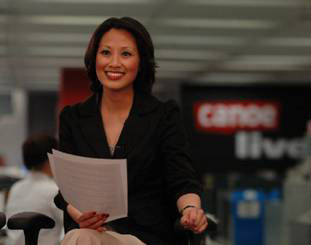THE TV STAR: Janette Luu
It's 3:30 pm and Janette Luu still hasn't had lunch yet. She's too busy getting ready to interview the mayor of Toronto and then later do research on a cyclist who is biking across Canada to raise money for cancer.
Despite hectic days like this Luu is still pleased with her decision not to become a doctor, like she thought she would be when she grew up. Instead, she became the first-ever Vietnamese TV news anchor in Toronto.
"It's an honour to know that I'm the only Vietnamese on a major television newscast here. But I'm surprised that there haven't been more of us on TV since Canada celebrates multiculturalism," says Luu, who moved here from Fort Wayne, Indiana to host CANOE Live, Channel 15's six-o'clock current affairs show.
Like all Vietnamese kids, Luu's family had hopes of her studying medicine. She enrolled for pre-med at University of Michigan but after graduating, Luu was drawn to TV journalism. Her career began as a production assistant at ABC news, where she edited news stories and ran TelePrompTer. In about a year and a half, she worked her way up to becoming only the second Vietnamese TV reporter in her city.
Despite growing-up in a predominately Caucasian town and working in an industry where there are so few Vietnamese, Luu remains proud of her heritage and has never let go of her roots.
"It was hard to find Viet friends growing up in a small US city but I never forgot my culture. I loved watching Paris by Night with my parents and I studied Vietnamese writing in university. The first thing I did when I moved to Toronto was try to find the best banh cuon place in the city," says Luu.

Janette Luu, Toronto's first Vietnamese TV news anchor, gets ready for show time.
On this day, I join her in the news studio where we discuss City Hall politics on live-television. The TV spotlight makes me nervous and start to cà lăm (stutter), but Luu is calm and professional, just like the veteran anchors on CTV or Global news. After the show is over, I suddenly appreciate the surreal moment we just had. Who would have ever imagined seeing two Vietnamese on TV talking about the news one day? We start discussing why there aren't more Viets in the media.
"I think Viets tend to play it safe. We don't like to take risks when it comes to our careers. Being a reporter takes a lot of hard work and a lot of luck. If you make it, there are many rewards. It can pay very well, and I get to meet interesting and high-profile people everyday," says Luu.
"If a little girl watches me on TV, I hope she realizes that she can do it too. Parents want what is best for their children, but many don't understand what a journalism career is about, so they steer their children towards more traditional jobs. That's unfortunate because we need more Viet voices in the media."
It's tough to name more than five Vietnamese journalists working in the Canadian media. Other than Luu, I can only think of Linda Nguyen at the Toronto Star right now. That's why when I see a fellow Viet reporter I want to give them a big hug.
Why does it matter if our community has a voice in mainstream TV and newspapers? Media access equals a chance to show cultural pride. Without it, we are a community that is either misunderstood or simply invisible.
This was most evident at the flag raising ceremony at City Hall a few months ago. It was a well organized event featuring over 7,000 Viets proudly showing patriotism. However, there was no media coverage whatsoever.
Meanwhile, on the same day, 50,000 Sikhs celebrated their culture and every TV station and newspaper had reporters covering the event. As beautiful as the Vietnamese flag raising event at City Hall was, does it even matter if only Viets knew about it?
Media access also equals power, and communities that understand this are to be respected and rewarded. For example, there is a direct correlation between the high-profile that minority groups such as the Chinese and the South Asians enjoy in the mainstream media and the number of Chinese and South Asians that make it into Parliament. That is why issues that affect these communities are attended to promptly by politicians. Meanwhile, concerns from the Vietnamese communities are not considered urgent because we don't have a voice.
Media power is totally accessible, we just have to want it, not be complacent, and grab the city's attention so that our community can shine.
"I want to help put more Viets on TV. I would love to mentor and be a bigger part of the Vietnamese community here," says Luu.
I have no doubt that someone from this talented generation will emerge as the next great spokesperson for our community in the media. I just hope they come along soon, because I'm getting tired of hugging the same two Viet journalists over and over again.
Written by Thien Huynh
Thien Huynh is a reporter for 24 Hours and appears on SUN TV every Thursday. If you would like to nominate someone for Pride of the Vietnamese or have a story to tell, contact him at thienh112@yahoo.com or Thoi Bao at contributions@thoibao.com




